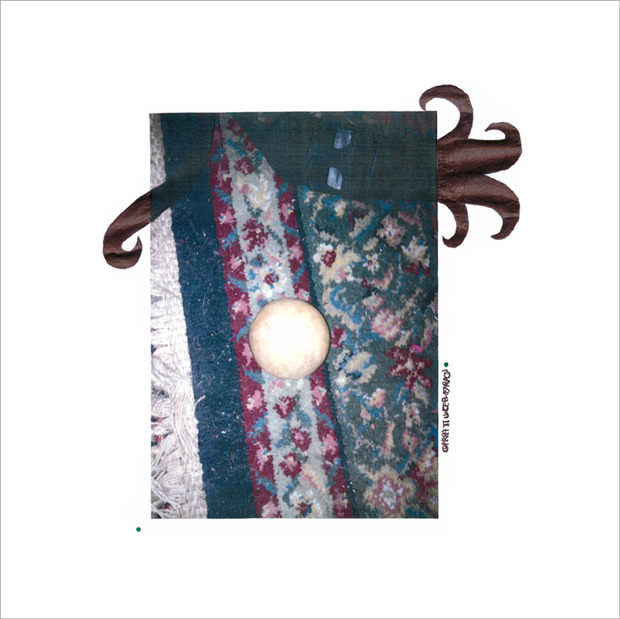Blanche Blanche Blanche makes music that sometimes sounds more like a thesis statement than a collection of pop songs. The ramshackle rhythms, atonal electronics squelching, (very) loose structures, and stream-of-consciousness words that make up the Vermont duo’s songs could be seen as trying to make some kind of broader experimental “point”; at least by those who might assume that their sonic simplicity belies a more nuanced or complex concern. This might read as a bad thing: who likes their music to be clinical and academic, anyway? Fortunately, however, Sarah Smith and Zach Phillips are talented enough musicians to look past the impulse to over-intellectualize their material and instead focus on the tunes themselves. Their latest album, Wooden Ball comprises 16 of them. And at less than a half hour overall, the album doesn’t linger on any of them long enough to risk their becoming too precious.
Smith has always taken a page from the Eleanor Friedberger book of esoteric lyricism, sing-speaking non-sequiturs and parallel-universe children’s rhymes punctuated by surprisingly revealing tidbits. For instance, on last year’s “The North Cave,” she informed us that “I can admit I started smoking now again. Maybe I will die, but smoking’s right,” over a quietly chaotic 8-bit backdrop. Such moments may be random, but they also serve to humanize the duo making these sounds, which in turn also helps with ensuring that the music doesn’t descend into boringly academic territory. Wooden Ball capitalizes on this, making their lyrical stories more personal and affecting, resulting in a work that sounds just as lovingly handcrafted as its title suggests.
“I never had nothing at all, not even a hope,” Smith sings at the start of opener “Rich Man,” as an unexpectedly aggressive, almost post-punk synth bass pounds away in the background. “TED Talks” actually features a refrain: Smith watches “TED talks / Just to keep from looking at the cops.” The fact that we hear echoes of these lyrics in the following track suggests the kind of mental preoccupation all of us experiences at one point or another; even when we try to move on, some memories–important or trivial–just seem to stick with us for whatever reason.
The vagaries of memory becomes a more explicit theme of the album on “Time To Remember.” “It’s so crowded in the past, of where what’s been and where it’s at,” Smith sings, before providing us with an example: “I got my face painted at the fair / It wasn’t in the legend anywhere.” Meanwhile, “The One I’ll Call” approximates a take on just the sort of silly, half-remembered reggae one might recall from, say, a puka-shell-necklace booth at a county fair. As we’ve established, memories are rather unpredictable like that. “Tomorrow is a good day around here,” she adds on “I Circle Near,” perhaps because it’s entirely unpredictable and not yet subject to the whirlwind brain processing of reminiscence and recollection. “Why The Candle Burns” is perhaps the most explicit iteration of this theme: “These aren’t my words. / I found them in a song I never heard.”
In addition to further exploring processes and side-effects of memory, Wooden Ball also spreads its musical wings in miniature, usually delightful ways. “Join The Creative Class” uses overdriven guitars to musically represent the frustration Smith and Phillips must occasionally feel as lo-fi indie artists: “It takes a lot of income to join the creative class / You’re paying out of your ass, and you’re loving that ‘Application Denied. “When Iggy Pop complains about his job, he’s obviously playing a character (or playing to his audience’s occupational resentment). When Blanche Blanche Blanche do it, you get the sense they’re speaking from experience. The tumbling piano keys of “The Kind Dry Stream” offer another reference point to the Fiery Furnaces (especially circa Gallowsbird’s Bark). “I Circle Near” is one of several tracks to get pretty crazy with funky basslines, imbuing their songs (or song sketches) with a sense of urgency we haven’t really heard from them before. And the many synth noises on display here run the gamut from vaporwave-R&B to 80s-action-movie-jams and Throbbing Gristle-esque industrial tones. By the time we get to the filtered brass of “How Simple Is The Child,” it’s evident that Blanche3 are interested in exploration on more than just a lyrical or structural level. At times, things get a bit too cacophonous for their own good, but at least it shows they’re trying.
All this makes for a compelling if brief listen from a group that clearly has a lot to say. But what makes Wooden Ball worth coming back to is its final track, “Looks Don’t Run,” which at almost five minutes has to be the longest in the Blanche catalog. A plodding, Sgt.-Pepper-as-bedroom-pop anthem of sunken guitars, decimated music boxes, and marching-band rhythm, it points the way toward the kind of fleshed-out psychedelia Blanche Blanche Blanche could make in the future, if they so choose. It spends its final half riding a guitar jam (yep, jam) into cassette static, like something we’re already struggling to recall even though it just happened. If Wooden Ball is a thesis statement, then “Looks Don’t Run” could serve as its abstract: this is what it sounds like to remember pop music.

